Ken Lizzi's Blog, page 12
September 17, 2023
Poul Anderson’s Rogue Sword.

I picked up Poul Anderson’s Rogue Sword in a batch that also contained Clark Ashton Smith’s The Last Incarnation and Leigh Brackett’s The Coming of the Terrans. So, good company all around. Insofar as the book is historical fiction marketed as fantasy, it reminds me of Edgar Rice Burrough’s I Am a Barbarian. However, whereas ERB’s book is set in the period of the early Roman Empire, Anderson’s takes place primarily at the beginning of the Fourteenth Century AD. The tone is in some ways similar: both books take unflinching looks at the miseries and evils of the times in question, the slavery, savagery, superstition, and injustices. The greatest departure is, I think the main character. ERB’s narrator is, generally speaking, pure at heart, a noble barbarian. Anderson’s? Well, therein lies the tale.
The story commences in a fashion that suggests we are in for a picaresque. Lucas Greco, in classic roguish fashion, escapes from a woman’s boudoir in Venice, diving into a canal a step ahead of a furious husband. He’s just a lad. He needs to flee Venice. So much for the prologue, though in Anderson’s hands it is turns out to be much more than a jumping off point. As the story progresses (picking up fourteen years later) it becomes increasingly obvious that it is not a picaresque. Instead it is a semi-tragic story of a man whose troubles result from his own sins. In this case the peccadillo in question is a pronounced tendency to satyriasis. Consensual, at least: he’s a tomcat, not a rapist. But Lucco — or Lucas, as circumstances warrant — cannot keep it in his pants. Everything that follows (commencing with his Venice fling) is a result. This is a classic example of character driving plot.
Lucas is at heart a good man, searching for meaning and trying to find a home. He’d spent half his life traveling, having adventures (and meeting women), getting as far as Cathay, where he spent a considerable time as a guest of the Khan. Now back in the crumbling Byzantine Empire, he inadvertently rescues a Circassian slave girl and his past catches up with him. He becomes part of a mercenary company, the Grand Catalan Company, and experiences the horrors involved in indiscriminate warfare, raiding, and the sacking of towns. Anderson shows his research, providing details of a relatively little known facet of the history of the Middle Ages. Lucas is a reluctant participant, and Anderson does an excellent job recounting Lucas’ rationalizations, qualms, and justifications.
Becoming involved with yet another woman (despite his continuing possession of/dalliance with the infatuated Circassian) leads to yet more complications: violent, deadly complications, written with a good eye for period equipment and tactics. Lucas is required to make hard choices, especially hard choices when doing the right thing requires betrayal of the closest thing to a father he has.
Anderson doesn’t flinch. He shows the filth and ugliness along with the excitement and adventure. That is, I think, the factor that elevates Rogue Sword above a run-of-the-mill historical adventure.
If you are in the mood for gritty adventure, give the Falchion’s Company series a try, available in print, digital, and audio formats. I may even have some audio book promo codes available, if you’d like to listen for free.
September 10, 2023
Clark Ashton Smith. The Last Incantation
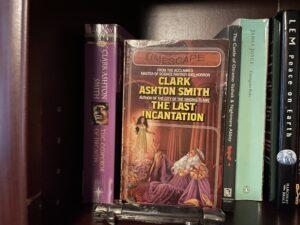
I picked up a copy of Clark Ashton Smith’s The Last Incantation. I figured I’d probably read some of the stories before in collections or anthologies before, and such proved the case. But there were some I had the pleasure of reading for the first time, and re-reading CAS is never a chore. It was a treat to revisit some old favorites.
A few comments on the contents:
The Double Shadow. The first of three of CAS’ Poseidonis stories. Atmospheric reiteration of a warning against hubris. Right off the bat CAS displays his mastery of growing horror.
The Last Incantation. The collection’s titular tale. Short, filled with gorgeous detail. In a sense this a parable illustrating Heraclitus’ axiom that you can never set foot in the same river twice. None of us remain the same person we once were.
The Death of Malygris. Beware a powerful sorcerer. Even if he does seem to have died. Or even if he has.
Seedling of Mars. CAS’ glorious prose creates a beguiling, immersive atmosphere in his fantasies, such as the Poseidonis stories preceding. But it can feel unnatural in what is purportedly a more-or-less straight forward science fiction story. For me, a bit of a clunker.
The Ice-Demon. I believe CAS’s Hyperborea stories are meant to chronologically precede his Poseidonis tales. This is a good one, a sort of Fire and Ice fantasy/action/horror story.
Ubbo-Sathla. Tangentially a Hyperborea story. This is more of a weird tale than a fantasy, a regression through the mists of time to a sort of Lovecraftian primordial dawn.
The Plutionian Drug. A rather simple science fiction story. CAS’s prose is less florid and more suited to the material. There isn’t much there, but it is well done for what it is. CAS writes drug-distorted perceptions vividly. One wonders…
The Colossus of Ylourgne. Always glad to get back to CAS’s Averoigne. In my personal literary universe, Averoigne and Joiry inhabit the same world and time. In some untold story, C.L. Moore’s Jirel crossed paths with Gaspard du Nord. Famously the inspiration of the D&D module Castle of Amber, Colossus is — while horrific — more of an adventure story than we normally get from CAS. A favorite.
The Holiness of Azedarac. An Averoigne time travel story, and — in rather a departure for CAS — a romance.
The End of the Story. An eighteenth century Averoigne vampire story.
The Vaults of Yoh-Vombis. Back to Mars, but unlike the unfortunate Seedling story, this is the Mars of Leigh Brackett and C.L. Moore — ancient, dry, and inhabited by Martians. CAS sets an Alien-like horror story in the ruins of a lost Martian city. Pretty good.
The Devotee of Evil. The final three stories are essentially weird tales, set at least in part in CAS’ contemporary California Bay Area. This one is a story of dark psychology and supernatural horror.
The Root of Ampoi. Perhaps the most traditional of CAS’ weird tales: an old-school adventure yarn featuring a shipwrecked British mariner and a lost civilization, as recounted to a California doctor.
Genius Loci. A slow burn of a descent into supernaturally induced madness. Old Man Willow and Tom Bombadill as portrayed in an evil fun house mirror.
So, as if anyone needs me to say it, Clark Ashton Smith is worth your time. This collection is a good one.
You know what else might be worth your time? Something of mine, though I’m not fool enough to claim I’m in the same league as CAS. Get yourself a copy of Blood and Jade, the first book in the Semi-Autos and Sorcery series. And please, leave reviews.
September 3, 2023
Lawrence Watt-Evans’ “The Lords of D��s.” Immanentizing the Eschaton.
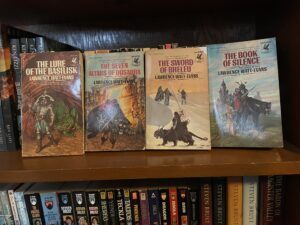
It was the Darrell K. Sweet cover that lured me to the first book, The Lure of the Basilisk. This introduced me to the world of Lawrence Watt-Evans’ The Lords of D��s tetralogy and his unique character, Garth the Overman. The overmen were, it seems, magically created genetic mutations of men, made larger, stronger, less emotional, and with certain other physical traits including a second opposable thumb, thicker skin, and Halloween mask facial features. Writing from a non-human perspective can be challenging, but Watt-Evans gives overmen generally overlapping character traits, so greed, anger, and curiosity all can play a role.
The first novel commences with Garth experiencing existential angst and wishing that his name would live forever. He consults three wise women — that is, overmen — and is sent on quest that initiates four novels worth of events, though that is far from obvious by the end of the first novel. The Overmen live far to the north in an icy wasteland, separated from men, after losing the Racial War three hundred years ago. Garth is sent to visit The Forgotten King in the most northerly human settlement, and instructed to do as The Forgotten King requests. (The Forgotten King is also referred to at times as The King in Yellow, which, along with references to Hastur and Carcosa (with that spelling) provide little Easter eggs throughout the novels, though without any particular payoff.) The Forgotten King tells Garth to visit a distant city and bring back the first living thing he encounters in the dungeons beneath. This turns out to be the titular Basilisk. Garth’s fulfillment of this quest occupies the bulk of the novel and it is narrated in exhaustive detail. It is clear that Watt-Evans pondered each twist and turn, each doorway, conceived of each difficulty — major or minor — and worked out how his hero would overcome it. And he shows his work.
The second novel, The Seven Altars of D��sarra finds Garth once again, reluctantly, doing the bidding of The Forgotten King, after Garth’s pragmatic attempt to establish trade between the northern human settlement and the overmen runs into difficulties. The Forgotten King requires Garth to bring back whatever he finds on each of the altars of the seven gods of D��sarra. The seven dark gods. Again we follow the procedural details, sitting in on Garth’s decision process. Every factor, every possibility is weighed, then Garth acts. Garth ends up returning to The Forgotten King with a sword that seems to have a will of its own — stronger than Garth’s, for that matter — and a woman, a sacrifice encountered on one of the altars. We begin to get more detailed world building, especially concerning the religious pantheon and, as we discover, the building blocks of the plot and end game of the series.
The third novel, The Sword of Bheleu, at times feels like it is merely filler, something to pass the time until we get to the fourth book. It also lacks a Darrell K. Sweet cover. While Laurence Schwinger’s cover is adequate, he doesn’t appear to have read the description of either an overman or the Warbeast upon which he rides. The book isn’t, of course, mere filler. We learn about the Bheleu, the god of destruction and how through his sword Garth becomes his tool. Garth succumbs to rage, driven by Bheleu to acts of horrific violence and demolition. The sword is — to employ Dungeons and Dragons terminology — of Artifact power levels. (Speaking of D&D, I wonder if anyone has ever statted Warbeasts. Tough. The sort of thing you’d want on your side rather than in opposition.) We get more world building, learning about a council of wizards which decides that it needs to oppose Garth in order to avoid the apocalyptic age of destruction that Bheleu portends.
The stakes ramp up in the fourth book, The Book of Silence. After an introductory seventy or so pages (the page counts increase book by book) that have absolutely no bearing on the plot and provide no payoff (as if Watt-Evans forgot all about it, or was just playing around with an idea he thought was fun but couldn’t figure out how to incorporate it into the rest of the narrative) Garth struggles to avoid working for the Forgotten King. He fears that following the instructions and wishes of the Forgotten King might lead to the end of the world, of all life, of even time itself. We get some cool monsters, some minutely detailed fight scenes, vicious acts of revenge from one of the priesthoods whose altar Garth had defiled, magic, travel, traps, etc. All of which are explained in the painstaking detail we’ve come to expect. And therein lies some of my issue with the series. It is entirely too procedural. We are presented with these sweeping, world-shattering events. And yet they are dealt with cooly, as if narrated by Mr. Spock. There should be an undercurrent of blood and thunder, rather than simply being told that there is blood and thunder. I don’t feel it. Garth sifts and weighs every action, speculates on every characters motivation, looks at every angle. It is as if Watt-Evans wants us to know that he has carefully considered the world and each character, and that he has worked everything out to a logical inevitability; that this is serious, not crazy-pants fantasy in which anything could happen without rhyme or reason. And I get that. But I prefer not to spend quite so much time with the decision making process behind each action, each statement. For one thing, people aren’t that calculating. Not even overmen, if I can judge from the other overmen characters we meet in the books. For another, it slows everything down.
I think if the tetralogy had been trimmed down to a trilogy, with much of the fat excised, I would have enjoyed it more than I did. Not that I dislike it. I don’t regret reading it. There are some interesting set pieces. Garth is a unique character, a tragic figure vaguely reminiscent of Karl Edward Wagner’s Kane, whose decisions seem inevitably to lead to wholesale carnage and destruction. Also, I got three Darrell K. Sweet covers. I may well be guilty of overanalyzing, and you might breeze through these more pleasurably than I did. I really did like the first one. The procedural aspect worked well. Different strokes for different folks is what I’m saying, I suppose.
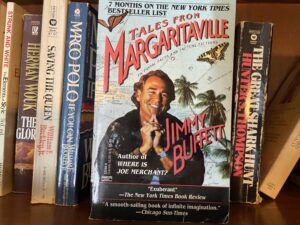
Before I move on to my usual crass commercialism, I want to note the passing of an American icon. Jimmy Buffett played an outsized role in the lives of many. I first paid attention to him in my sophomore year of college, picking up a live, double-album LP at a used record store. Endless plays, along with reading a non-fiction account of a man walking around the world, solo, led me to seriously consider dropping out of school. After all, what more interesting occupation for a would-be writer could there be than wandering the Earth along, like Caine. (Kwai Chang Caine, not KWE’s Kane.) I went so far as to begin pricing equipment at outdoor stores and military surplus stores. Happily I let the idea drop. I’d hate to imagine discovering plantar fasciitis in the middle of nowhere — halfway across Bulgaria or something. It was bad enough discovering it in the army. In fact Buffett helped get me through the army. I’d mentally review lyrics while performing some mindless, make-work chore in basic training. Buffett cassette tapes and a walkman accompanied me on deployments to Honduras and Haiti. I attended five or six concerts over the years. He was a hell of a showman. The passing of celebrities, most of whom I’ve never met, generally leaves me unaffected. But the loss of Jimmy Buffett leaves a hole. I’ll miss him.
I don’t really have a segue to selling books. Maybe Reunion, with its themes of loss might be an appropriate read. Or perhaps Thick As Thieves. Either way, you’d get a good read.
August 27, 2023
Ursula Bruin

A couple of years ago I wrote a tale for the Heir Apparent. She was seven at the time and ardently fond of a number of things girls her age tend to be. So I attempted to incorporate several of her obsessions into the narrative. I believe I succeeded, as she was highly pleased with story, titled Ursula Bruin. I had not intended to take the project any further, having written it solely for the benefit of the HA. I did have some encouragement in that direction, though I ignored it. I ignored it, that is, until I learned about the Amazon publishing program called Kindle Vella, a site allowing readers to enjoy serialized fiction. That got me thinking.
Thinking led to action. I’ve divided Ursula Bruin along the natural fracture points of the tale and have begun posting them on the Kindle Vella site. You can begin reading here, if you are so inclined. Or, more likely, you can begin reading aloud to your child, grandchild, niece or nephew, etc., if you have one of the age to appreciate children’s stories. If you value sharing something with a bit more of an old-fashioned feel, something not attempting to preach whatever the current thing is, something with a time-honored message of friendship and developing one’s personal strength, then Ursula Bruin just might be the tale you want to offer as a bedtime story for the little ones.
Many thanks to My Beautiful Wife for the “cover” art. MBW has a gift for visual art that I lack.
The first three episodes of Ursula Bruin are, I believe, free. I will continue adding additional episodes until the story is done. Give it a read and let me know what you and your young auditors think.
August 20, 2023
Currently Reading.
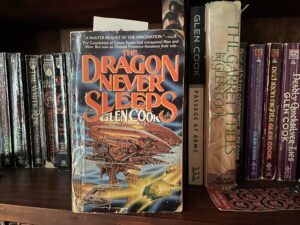
Happily I will never run out of reading matter. There are five books waiting in the ever-replenishing to-be-read pile. Currently I am finishing up Glen Cook’s The Dragon Never Sleeps. This is an epic, sweeping, galaxy crossing space opera of improbably massive space ships clashing, power dynamics, and the pursuit of quasi-immortality. At over 400 pages it is meaty. But this is Cook, which means that what is communicated in 400 hundred pages by Glen Cook would require 700 or 800 for most any other writer. Cook is of the Ernest Hemingway school; lean, efficient. All excess description is mercilessly trimmed. His focus is on the story. Given the complexity, machinations, scheming, politics, space-spanning military campaigns, and alien species philosophies, I am gratified that he simplified the work. Otherwise I’d need a score book and an index to keep track.
Most of my Glen Cook reading has been his fantasies. But he is also masterful with science-fiction. I’ve previously read his Run Silent Run Deep-esque Passage at Arms as well as Shadowline, the first of his Wagnerian Starfishes space opera series. All good stuff, each written with a distinct voice, though that voice is clearly Cook’s.
On audio book, for the return leg of my shuttling the HA to fourth grade and for daily grind at the gym, I am listening to a collection of Larry Correia short stories, Target Rich Environment vol. 1.��These are good, visceral, and occasionally quite funny. (For the drive in to the HA’s school we are listening to P.L. Traver’s Mary Poppins. I don’t think profanity, ballistic trajectories, and the size and shape of exit wounds are appropriate for the HA just yet.)
Of course I am still writing. But I will sit on the status of various projects for now. But if you are interested in reading something actually completed and published, may I suggest the Semi-Autos and Sorcery series?
August 13, 2023
Dust Off Your Fluffy Cthulhu Birthday Hat
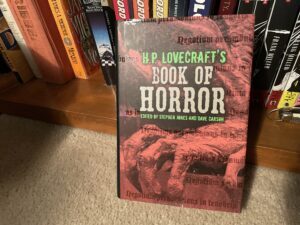
Next week marks the 133rd birthday of Howard Phillips Lovecraft. I wonder if he would be surprised at his influence. He spawned an entire sub-genre: Lovecraftian Horror. Its tentacles reach from prose to film to games to seemingly every type of collectible merchandise imaginable.
I wonder if this prominence, this degree of ubiquity would tickle his vanity. Or would he be in the Tolkien “deplorable cultus” camp, disgusted with the whole circus? I imagine he might be disgruntled at the fact that his work became the source of income for so many while he barely scraped by. August Derleth, Robert Bloch, and many others owed much of their success to exploring the grim cosmos he created. Perhaps Lovecraft might consider it more evidence for his central thesis of a cold, uncaring universe.
It would be fascinating to learn the answers to my musings. Imagine the afterlife correspondence between Lovecraft and Robert E. Howard.
Well, enough idle speculation. How about some idle reading? My first novel, Reunion (wow, about ten months away from its tenth publication anniversary) would fill some leisure hours.
August 6, 2023
Tower at the Edge of Time. Not Precisely a Towering Achievement.
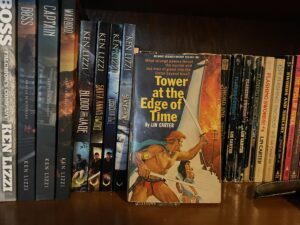
The indefatigable Lin Carter published a slender novel in 1968 titled��Tower at the Edge of Time. I have been open in my admiration for Mr. Carter’s gifts as a scholar, editor, and stylistic imitator. I even enjoy, on occasion, his more independently innovative works. That being said…Well, let me just get into it.
Tower is an attempt to create a Burroughsian, John Carteresque superman who acts upon a stage larger than Barroom. That larger stage is part of the problem. Edgar Rice Burroughs focused several books on one planet. Carter tries to fit a galaxy into 140 pages. This book is at best a bagatelle. It is a carnival barker of a tale that promises much and delivers little but glitter, smoke, and bombast. It is, as indicated, short. That is both its strength and its downfall. The merciful brevity keeps the reader moving and ignoring the fact that the whole narrative edifice is a latticework of illogic, the gaps passed over by tenuous interconnecting spans of the Rule of Cool. The downside is that there is very little story at all. Interesting character interactions seldom pay off. Much of the page length is just a collection of words that create an evocative image when placed together, but are never developed. Examples gleaned at random: Onolk the Space God, Red Hills in the Land of Fire, The Autarchate of the Orion Worlds. Carter never develops these people or places, seeming to think that hurling several hundred names at the reader is sufficient world building. It is like reading a menu that you are unable to order from.
What intrigued me most was that Carter did seem to like a few of these notions and phrases enough to expand on them in his World’s End��series; the Tigermen for instance, or the Pseudowomen. I also wonder if Gary Gygax read this before cobbling together the (seldom used, thankfully) psionics rules in the Dungeon Masters Guide. Tower was written during that period when speculative fiction authors seemed obsessed with psychic powers, and Carter treats us to a couple of chapters worth of his hero’s mental feats, some of which seem to align perfectly with certain gifts Gygax enumerated.
But these points of interest are extraneous to the book itself, almost academic. The novel itself is…empty. There is no there, there. It culminates in a sort of bland, After School Special message. Nothing is paid off. None of the thousand intriguing people, places, historical events, or political concepts are developed at all. It is as if Frank Herbert’s entire Dune series was abridged and redacted to a collection of character names, planets, and organizations, with all depth, philosophy, and character development excised.
That said, a few of the set piece fights and chases were kind of fun. And, as noted, it is short.
Some of my books are relatively short. Thick As Thieves, for example is under 70,000 words. Give that one a try. Let me know what you think.
July 30, 2023
Old Stomping Grounds. Part Two.
Only days remain in my stay back in Oregon. I will be returning to Casa Lizzi in Texas early Tuesday morning. I’m beginning to look forward with some eagerness to my own bed, my library, my familiar routine.
Yet it has been a good trip. MBW joined me Tuesday. As per her wish (happily granted) the first stop after the airport was Fire on the Mountain for wings. Raspberry Habanero and Lime Cilantro sauces. It remains as good as I remembered. I traded in the borrowed Jeep for a rental car. As I’d ordered the manager’s special I was uncertain what wheels I would get. The only vehicle on the lot was a Tesla. I was, I admit, curious, though trepidatious about charging it in the locations I intended to spend much of the remainder of my trip. I needn’t have worried. Ten seconds before the paperwork was completed, a renter returned a Volkswagen Jetta. The rental agent mumbled something about needing a Tesla for the next day. I felt no compulsion to argue.
The HA enjoyed sleep-overs at the homes of a couple different old friends. MBW and I made rounds of visitation in our old neighborhood. We stopped at a restaurant we’d meant for years to try. And now I wish we had. The view was terrific and the elk burger delicious.
 Lunch Date
Lunch DateWe bunked at my aunt and uncle’s house for most of the week. There we had a curious visitor nibbling strawberries five or six feet away from the door. I waited long enough for MBW to take his picture before I interrupted his breakfast. Out in the countryside I was nowhere near a gymnasium. Happily my uncle had an eighty-plus foot tree felled and sliced into rounds which required chopping into firewood. Getting through a portion of that provided me with a couple of days worth of workouts.
 Venison Home Delivery
Venison Home Delivery By this axe I…turn chunks of wood into smaller chunks of wood?
By this axe I…turn chunks of wood into smaller chunks of wood? The stack grows.
The stack grows. Getting stuck in.
Getting stuck in.We are spending the last day and a half prior to the return flight at a cabin on the river. I can’t even begin to count how many weekends I have spent up here. It is peaceful sitting by the Salmon River as it chuckles and murmurs to itself. And soon…home.
Oh right, advertising. Buy my books. There. Until next week.
July 23, 2023
Old Stomping Grounds. Part One.
It was just over a year ago that MBW, the HA, and I began our trek from Oregon to Texas. I flew back with the HA for a visit last week. MBW will join us in a few days. Why the trip? Why not?
I drove the HA south to a spot roughly halfway between Portland and my mother’s house. There the HA switched cars and continued on south to spend a week with her grandmother. I headed back to the house of some friends where I’m spending the first week of my sojourn.
I think it is fair to say I’ve been keeping busy. I visited the offices of a client, spending a couple of days working there, laptop set on a spare desk. I’ve made solid progress on a new novel, finishing up chapter one. I’ve visited old friends. I took the requisite journey to Powell’s bookstore. I’ve sampled the offerings of brewpubs. I even got in nine holes of golf. And I had the leisure to take in a baseball game. (If you saw the Netflix show The Battered Bastards of Baseball you might be familiar with the Portland Mavericks. I actually attended a game when I was about nine years old. The team folded, but the continuity and trademark somehow lived on and is currently incarnated in an independent league team in Keizer, Oregon.)
The trip continues. As long as I have my laptop and internet access, I can continue working. I’m not on vacation. Yet I am enjoying working in old, familiar surroundings. (Well, mostly. I am frequently reminded of why I moved in the first place. But this isn’t the place for grousing.)
Now for some pictures, following this word from our sponsor (me.)
Do you like reading? If so, why not try a book by Ken Lizzi. You may enjoy it. Many people have. Here’s a link to his latest series, Semi-Autos and Sorcery.
Right, that’s out of the way. Here’s a photo dump.
 In bound
In bound Powell’s Bookstore
Powell’s Bookstore Fore!
Fore! Outside the Stadium
Outside the Stadium Play ball!
Play ball! Heavy Slice Hazy IPA
Heavy Slice Hazy IPA Loowit Brewing, Vancouver, WA
Loowit Brewing, Vancouver, WA
July 16, 2023
The Web Log is Traveling.
The HA and I flew from Houston to Portland yesterday. Today I drove south about halfway across the State of Oregon and handed over the HA to her grandmother. She should enjoy a week on the Northern California coast. I drove back to my temporary headquarters where I’ll…go back to work, same as always. I suppose yours truly no longer takes vacations. Even when I wasn’t self-employed I was still writing during vacations. And that works for me: I thrive on routine.
Anyway, it’s been a long couple of travel days. I’m tired and it is time to think about dinner. So that’s enough for today. Except for the obligatory self-promotion. Since I’m back in Portland for a visit, I think it only appropriate to recommend Reunion, in which I destroy the city. Reunion is available wherever you buy books online.



